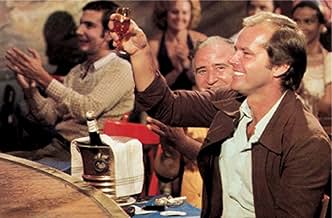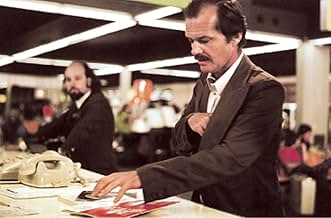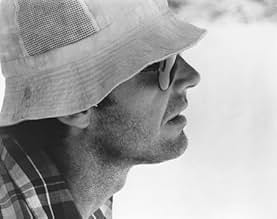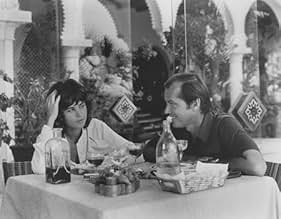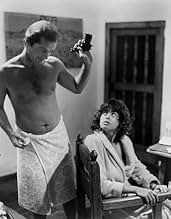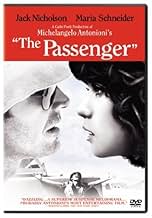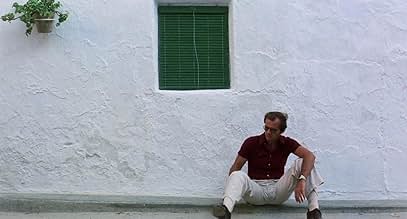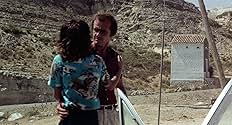Um correspondente de guerra frustrado, incapaz de encontrar a guerra que lhe foi pedido para cobrir, toma o caminho arriscado de apropriar-se da identidade de um conhecido traficante de arma... Ler tudoUm correspondente de guerra frustrado, incapaz de encontrar a guerra que lhe foi pedido para cobrir, toma o caminho arriscado de apropriar-se da identidade de um conhecido traficante de armas morto.Um correspondente de guerra frustrado, incapaz de encontrar a guerra que lhe foi pedido para cobrir, toma o caminho arriscado de apropriar-se da identidade de um conhecido traficante de armas morto.
- Prêmios
- 5 vitórias e 2 indicações no total
- Robertson
- (as Chuck Mulvehill)
- Hotel Clerk
- (não creditado)
- Murderer's accomplice
- (não creditado)
- Cameraman
- (não creditado)
Enredo
Você sabia?
- CuriosidadesWhen Michelangelo Antonioni received his honorary Oscar in 1995, the Academy asked Jack Nicholson to present it to him.
- Erros de gravaçãoThere are a couple of inaccuracies in the displayed details of Locke's Air Afrique air ticket that was evidently issued in Douala, Cameroon in August 1974. The name of Fort-Lamy (Chad's neighboring capital city) became N'djamena in early 1973, and Paris is written in Italian ("Parigi") which would not have occurred in French-speaking Douala.
- Citações
The Girl: Isn't it funny how things happen? All the shapes we make. Wouldn't it be terrible to be blind?
David Locke: I know a man who was blind. When he was nearly 40 years old, he had an operation and regained his sight.
The Girl: How was it like?
David Locke: At first he was elated... really high. Faces... colors... landscapes. But then everything began to change. The world was much poorer than he imagined. No one had ever told him how much dirt there was. How much ugliness. He noticed ugliness everywhere. When he was blind... he used to cross the street alone with a stick. After he regained his sight... he became afraid. He began to live in darkness. He never left his room. After three years he killed himself.
- Cenas durante ou pós-créditosLeo, the MGM lion, which normally precedes the opening credits of MGM movies, has been supplanted by "BEGINNING OUR NEXT 50 YEARS". Leo then returns in the center with "GOLDEN ANNIVERSARY" on either side of it.
- Versões alternativasSeven minutes were added to the 2005-2006 re-release version, including a brief shot of a nude Maria Schneider in bed with Jack Nicholson in the Spanish hotel.
- ConexõesFeatured in Z Channel: A Magnificent Obsession (2004)
"I'd like to enquire about flights," Locke asks a hotel clerk. He seeks to escape his past. Later in the film, as he rides a cable cart, Locke spreads his arms and soars like a bird. He's flying, finally enjoying a brief moment of freedom.
The theme of identity, and Locke's name itself, immediately recalls the writings of English philosopher John Locke. Locke believed in the concept of the "tabula rasa" or blank slate. He believed that it was our experiences that defined us as people and that the only way to escape who we are is to effectively erase our history and cut ourselves off from experiences.
Throughout his writings, Locke emphasised the individual's freedom to author his or her own soul. Each individual was free to define his character, but his basic identity as a member of the human species could not be altered. So Locke had two ideas at war. Firstly the belief that the individual was free to author his own life, and secondly the belief that human nature is rigid and unchangeable. It is from this presumption of a free, self authored mind, combined with a sense of rigid human nature, that the Lockean doctrine of "natural" rights is derived.
In Antonioni's film, Nicholson articulates these ideas himself. He is trapped between wanting to be free and having to fulfil duties/roles/tasks embedded in the new persona he has acquired. While responding to a comment that all PLACES are the same, he even argues that it's actually the PEOPLE that are the same. That everyone conforms to specific cultural archetypes. The film's original title, "Profession: Reporter", highlights this point best.
Nicholson's character is desperate to escape this. Like his character in "Five Easy Pieces", he wants some unmappable freedom. He wants to be an individual. Beyond this, though, he wants to stay blank. In what is perhaps the film's most joyous moment, a female character asks Locke what he's running from. He tells her to turn her back to the front of the car. What occurs next is an instant of spontaneous elation and giddy happiness, as she watches the road rush away behind them.
But what people fail to notice during this scene, is that she is in fact watching the past. By facing her previous experiences (which Locke refuses to do) she is happy. Happiness comes from her memories and past encounters, while Locke is miserable simply because he refuses to acknowledge his past experiences.
Throughout the film Locke is asked whether he thinks "the landscape" is beautiful. Once he answers "no", another time he absent mindedly answers "yes", but Antonioni stresses that Locke is really not paying attention. Locke intentionally avoids absorbing beauty or new experiences in an effort to remain in a constant state of rebirth.
These themes are culminated in a brilliant "blind man" story towards the end of the film. Locke, a journalist who specialises in seeing and recording the truth, is painfully attuned to what he calls the "dirt" of the world. As such, he chooses to remain blind. A blank slate.
Antonioni is particularly good at endings and the final shot of "The Passenger" really elevates the whole film. Like the dead man, whose identity he took on, Locke dies alone and face down in a bed. His ex wife pops up and states that she never knew him, but nobody seems to care.
9/10- A great film, worth two viewings. It captures a profound sense of isolation and sadness. Antonioni's camera seems to capture the immense tiredness of the body. Rather than portray experiences, he shows what remains of past experiences. He shows what comes afterwards, when everything has been said. The middle portion of the film is slow and seems to be lacking some sort of superficial drama, but things build nicely and the final payoff well is worth the wait.
- tieman64
- 30 de abr. de 2008
- Link permanente
Principais escolhas
- How long is The Passenger?Fornecido pela Alexa
Detalhes
- Data de lançamento
- Países de origem
- Central de atendimento oficial
- Idiomas
- Também conhecido como
- The Passenger
- Locações de filme
- Fort Polignac, Algéria(desert scenes, setting: Chad)
- Empresas de produção
- Consulte mais créditos da empresa na IMDbPro
Bilheteria
- Faturamento bruto nos EUA e Canadá
- US$ 620.155
- Fim de semana de estreia nos EUA e Canadá
- US$ 24.157
- 30 de out. de 2005
- Faturamento bruto mundial
- US$ 769.503
Contribua para esta página




